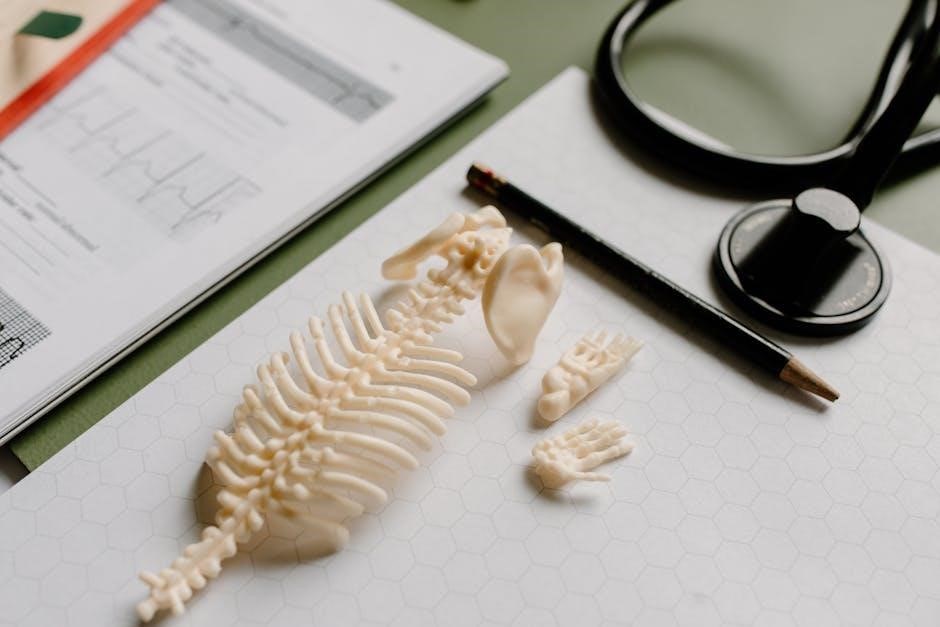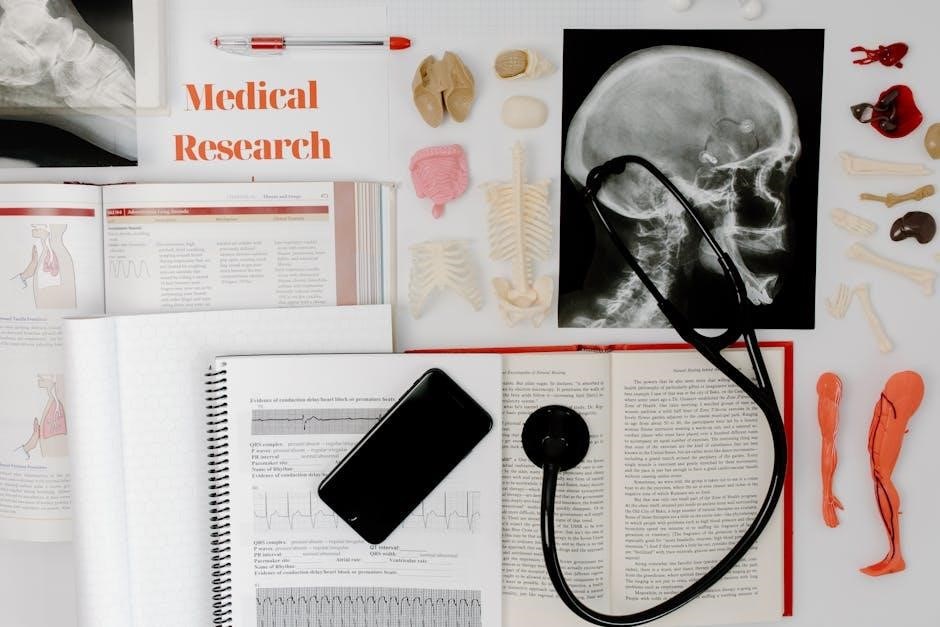med surg nursing study guide
Medical-Surgical (Med-Surg) Nursing is a dynamic field focusing on adult patient care, addressing medical and surgical conditions․ It combines theory and practical skills to manage diverse health needs․
1․1 Overview of Medical-Surgical Nursing
Medical-Surgical (Med-Surg) Nursing focuses on caring for adult patients with diverse medical and surgical conditions․ It integrates the management of both acute and chronic illnesses, emphasizing holistic care․ Nurses in this field assess, plan, and implement evidence-based interventions to promote recovery, prevent complications, and improve quality of life․ Med-Surg Nursing is a dynamic and versatile specialty, requiring strong clinical judgment and adaptability to varied patient needs․ It serves as a foundational area of practice, preparing nurses for specialized roles and advanced care settings․ This overview highlights the scope and significance of Med-Surg Nursing in healthcare delivery․
1․2 Key Concepts and Principles
Key concepts in Med-Surg Nursing include patient-centered care, evidence-based practice, and interprofessional collaboration․ Principles such as clinical judgment, prioritization, and holistic assessment guide nursing interventions․ Nurses must understand pathophysiology, pharmacology, and surgical care to manage diverse conditions effectively․ Emphasis is placed on prevention, early detection of complications, and promoting patient safety․ These principles ensure comprehensive, individualized care, addressing physical, emotional, and educational needs․ Mastery of these concepts is essential for delivering high-quality, patient-focused care in dynamic healthcare settings․
1․3 The Role of a Medical-Surgical Nurse
A Med-Surg Nurse provides care to adult patients with diverse medical and surgical conditions․ Their role includes assessing patient needs, developing care plans, administering medications, and monitoring recovery․ They collaborate with healthcare teams to ensure comprehensive care․ Patient education, wound care, and managing surgical recovery are key responsibilities․ Med-Surg Nurses must stay updated on evidence-based practices and technologies to deliver optimal care․ Their adaptability and critical thinking skills enable them to handle complex cases effectively, making them integral to healthcare teams․

Patient Assessment and Care Planning
Patient assessment involves evaluating physical, emotional, and medical needs to create personalized care plans․ Nurses use techniques like physical exams and health histories to guide effective care strategies․
2․1 Patient Assessment Techniques
Patient assessment techniques in med-surg nursing involve systematic methods to gather data about a patient’s health status․ These include physical examinations, health histories, and diagnostic tests․ Nurses use inspection, palpation, percussion, and auscultation to evaluate bodily systems․ Vital signs, such as blood pressure and oxygen saturation, are monitored to detect abnormalities․ Accurate documentation and communication of findings are crucial for developing effective care plans․ Observation and communication skills are essential for identifying subtle changes in a patient’s condition․ These techniques enable nurses to prioritize care and address both immediate and long-term needs effectively․
2․2 Developing Individualized Care Plans
Developing individualized care plans involves tailoring interventions to meet each patient’s unique needs and goals․ Nurses use assessment data to identify specific health issues and set prioritized, measurable objectives․ Care plans are created in collaboration with patients, families, and healthcare teams to ensure holistic and patient-centered care․ Interventions are selected based on evidence-based practices and the patient’s preferences․ Regular evaluation and documentation of progress are essential to adjust the plan as needed․ Effective communication and coordination ensure continuity of care, promoting optimal patient outcomes and enhancing quality of life throughout the recovery process․
2․3 Prioritization of Care
Prioritization of care is essential in med-surg nursing to ensure efficient and effective patient management․ Nurses assess patient conditions, identifying urgent needs and allocating resources accordingly․ The ABCs (Airway, Breathing, Circulation) framework guides immediate interventions․ Patients with life-threatening conditions are prioritized first․ Chronic or stable patients may receive deferred care․ The nurse must balance individual patient needs with the overall workload, ensuring timely and appropriate interventions․ Effective prioritization enhances patient safety, optimizes outcomes, and promotes efficient workflow in dynamic healthcare environments․ It requires strong clinical judgment and adaptability to evolving patient situations․

Common Medical Conditions
Medical-surgical nursing addresses various acute and chronic conditions, including cardiovascular, respiratory, and neurological disorders; Understanding these conditions is crucial for providing evidence-based, patient-centered care effectively․
3․1 Cardiovascular Disorders
Cardiovascular disorders are a primary focus in med-surg nursing, encompassing conditions like hypertension, heart failure, and coronary artery disease․ Nurses must assess symptoms, such as chest pain or dyspnea, and manage medications like beta-blockers and ACE inhibitors․ Monitoring for complications, such as arrhythmias or fluid overload, is critical․ Interventions include promoting lifestyle modifications, such as a low-sodium diet and regular exercise, and educating patients on medication adherence․ Understanding pathophysiology and evidenced-based practices is essential for optimizing patient outcomes in cardiovascular care․ Early detection and intervention are key to improving quality of life and reducing mortality rates․
3․2 Respiratory Disorders
Respiratory disorders, such as COPD, asthma, and pneumonia, require targeted nursing interventions․ Nurses assess symptoms like dyspnea, cough, and sputum production, and monitor oxygen saturation․ Interventions include oxygen therapy, bronchodilators, and pulmonary toileting․ Patient education focuses on inhaler use, smoking cessation, and energy conservation․ Managing complications, such as respiratory failure, involves close monitoring and ventilatory support․ Understanding pathophysiology and evidence-based practices is crucial for improving outcomes․ Early identification of respiratory distress and prompt intervention are vital to preventing progression and enhancing patient comfort and functionality․ Nurses play a key role in promoting lung health and managing chronic conditions effectively․
3․3 Neurological Disorders
Neurological disorders, such as stroke, TIA, seizures, and brain injuries, require precise nursing care․ Assessment includes evaluating neurological status using tools like the Glasgow Coma Scale and monitoring for deficits․ Interventions focus on managing symptoms, preventing complications, and promoting recovery․ Nurses administer medications, monitor intracranial pressure, and ensure cerebral perfusion․ Patient education emphasizes lifestyle modifications and rehabilitation strategies․ Early recognition of neurological changes is critical to improve outcomes․ Nurses play a vital role in supporting patients with chronic conditions and fostering adaptation to neurological deficits, ensuring holistic and evidence-based care․

Surgical Nursing Care
Surgical nursing involves preoperative, intraoperative, and postoperative care․ Nurses prepare patients, assist during surgeries, and monitor recovery, ensuring safety and comfort throughout the surgical process․
4․1 Preoperative Care
Preoperative care is crucial for ensuring patient safety and optimal surgical outcomes․ It involves a comprehensive assessment of the patient’s physical and emotional state, medical history, and lab results․ Nurses play a key role in educating patients about the procedure, recovery expectations, and postoperative care․ Medication management, such as withholding certain drugs, is also essential․ Additionally, preoperative care includes preparing the patient physically, addressing any allergies, and ensuring informed consent is obtained․ Effective communication and preparation help reduce anxiety and complications, laying the foundation for a smooth surgical experience․
4․2 Intraoperative Care
Intraoperative care focuses on maintaining patient safety and stability during surgery․ Nurses monitor vital signs, manage anesthesia effects, and ensure asepsis to prevent infections; They assist surgical teams, handle specimens, and document procedures․ Continuous communication with the anesthesia team is crucial to address any changes in the patient’s condition․ Nurses also manage surgical supplies and equipment, ensuring everything is readily available․ This phase requires precise attention to detail and adaptability to unexpected situations, making it a critical component of the surgical process․ Effective intraoperative care helps minimize risks and promotes optimal outcomes for the patient․
4․3 Postoperative Care
Postoperative care begins immediately after surgery, focusing on recovery and comfort․ Nurses monitor vital signs, manage pain, and assess for complications like bleeding or respiratory issues․ They ensure surgical sites are clean and dressing changes are performed as needed․ Patients are gradually mobilized to prevent immobility-related complications․ Education on wound care, medication use, and follow-up appointments is provided․ Effective communication and empathy are essential to address patient anxieties and promote a smooth transition to discharge․ This phase is crucial for ensuring patient safety and facilitating a full recovery․

Pharmacological Interventions
Pharmacological interventions involve administering medications to manage medical conditions; Nurses must understand drug classes, side effects, and dosages to ensure safe administration and monitor patient responses effectively․
5․1 Common Medications in Med-Surg Nursing
In Med-Surg nursing, common medications include antihypertensives (e․g․, ACE inhibitors, beta-blockers), anticoagulants (e․g․, heparin, warfarin), and analgesics (e․g․, opioids, NSAIDs)․ Antibiotics are frequently used for infections, while diuretics like furosemide manage fluid retention․ Bronchodilators (e․g․, albuterol) are essential for respiratory conditions․ Nurses must understand mechanisms, side effects, and dosages to ensure safe administration and monitor patient responses․ Effective medication management is critical for improving outcomes and preventing complications in diverse patient populations․
5․2 Medication Management Strategies
Effective medication management in Med-Surg nursing involves adhering to the “5 rights” (right patient, drug, dose, route, time)․ Nurses use tools like medication reconciliation and barcode scanning to minimize errors․ Individualized care plans guide dosing adjustments based on patient responses․ Patient education on side effects and adherence is crucial․ Regular monitoring of lab results and vital signs ensures safety․ Collaborating with pharmacists and physicians optimizes therapy․ Timely documentation and reporting adverse reactions are essential․ These strategies improve patient outcomes and reduce complications, aligning with evidence-based practices outlined in resources like the Study Guide for Medical-Surgical Nursing․

Clinical Judgment and Critical Thinking
Clinical judgment and critical thinking are essential in Med-Surg Nursing, enabling nurses to make sound decisions based on patient data and evidence-based practices․ Case studies and interactive exercises in study guides, such as those mentioned in the Study Guide for Medical-Surgical Nursing, help develop these skills․ Real-world scenarios and NCLEX-style questions further enhance problem-solving abilities, preparing nurses for complex patient care situations and promoting effective decision-making in dynamic healthcare settings․
6․1 Developing Clinical Judgment
Developing clinical judgment involves integrating critical thinking, patient data, and evidence-based practices․ Study guides, such as the Study Guide for Medical-Surgical Nursing, offer exercises and case studies to enhance decision-making skills․ Interactive tools like Davis Edge provide realistic scenarios, allowing nurses to analyze data and prioritize care effectively․ By practicing with NCLEX-style questions and reflecting on outcomes, nurses refine their ability to assess, diagnose, and intervene appropriately․ This process fosters confidence and competence in addressing complex patient needs, ensuring safe and effective care in diverse medical-surgical settings․
6․2 Case Studies for Practice
Case studies are essential for practicing clinical decision-making in Med-Surg Nursing․ Study guides, such as the Study Guide for Medical-Surgical Nursing, provide realistic scenarios that simulate patient care challenges․ These exercises require nurses to assess symptoms, interpret data, and develop appropriate interventions․ For example, a case study on a patient with diabetes might focus on managing hyperglycemia and preventing complications․ By analyzing these scenarios, nurses enhance their ability to recognize patterns, prioritize care, and implement evidence-based practices․ This practical approach improves critical thinking and prepares nurses for real-world patient interactions, ensuring better outcomes and higher quality care․

Study Resources and Tools
Online resources, such as Davis Edge and interactive platforms, provide NCLEX-style questions, flashcards, and case studies to enhance learning․ These tools are accessible anytime, anywhere, and support exam preparation effectively․
7․1 Recommended Study Guides
Recommended study guides for Med-Surg Nursing include the Study Guide for Medical-Surgical Nursing by Linda S․ Williams and Paula D․ Hopper, focusing on clinical judgment and patient care․ The Study Guide for Brunner & Suddarth’s Textbook of Medical-Surgical Nursing offers NCLEX-style questions and case studies․ Interactive tools like Davis Edge provide digital exercises and flashcards․ These resources are designed to enhance understanding, application, and exam preparation, ensuring comprehensive coverage of key concepts and clinical scenarios in Med-Surg Nursing․
7․2 Online Resources for Med-Surg Nursing
Online resources for Med-Surg Nursing include platforms like Davis Edge, offering interactive exercises and NCLEX-style questions․ The 2025 Edition eBook provides digital access to study materials․ Nursing School Bundle and flashcards are popular for exam prep․ Websites feature visual aids, such as diagrams and tables, to enhance learning․ These resources support self-paced study, clinical scenario analysis, and evidence-based practice updates, catering to diverse learning needs and helping students master Med-Surg Nursing concepts effectively․











Leave a Comment